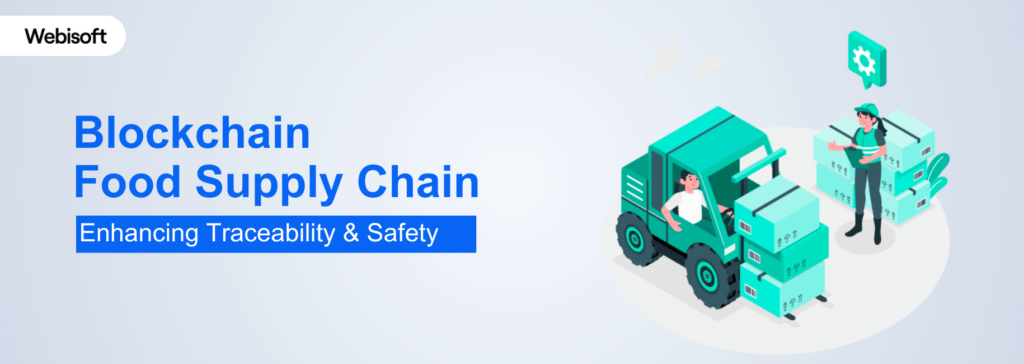The blockchain food supply chain is a simple way to track your food from where it’s grown to your plates using blockchain. This helps you know exactly where your food is coming from.
The perks of using blockchain in food supply are significant. It means safer food, transparency, efficiency, smart contracts, etc. But it’s not all smooth sailing. Bringing blockchain into the food supply can be tricky and expensive. Plus, keeping everyone’s data safe and understanding all the tech stuff is challenging.
So, in today’s guide, we will reveal all the benefits, challenges, and applications of blockchain in the food supply chain. Thus, keep reading!
Contents
- 1 What is Blockchain in Supply Chain?
- 2 How Does Blockchain Improve Food Safety In the Food Supply Chain?
- 3 Benefits of Blockchain in Food Supply Chain
- 4 Application of Blockchain in the Food Industry
- 5 Different Food Sectors Utilizing Blockchain in Food Supply Chain
- 6 What are the Challenges of Implementing Blockchain in the Food Supply Chain?
- 7 How Does Webisoft Help You to Implement Blockchain in the Food Supply Chain?
- 8 Final Note
- 9 Frequently Asked Questions
What is Blockchain in Supply Chain?
Blockchain in the food supply chain acts as a digital ledger system where each transaction is securely recorded. It ensures seamless and transparent tracking throughout the chain.. This technology ensures that every step, from farm to table, is traceable.
As a decentralized system, it allows multiple stakeholders to access and verify transactions. This way, everyone involved, from farmers to consumers, can track the journey of food products. The records are tamper-proof, enhancing safety and trust.
However, blockchain’s transparency reduces the risks of food fraud and contamination. It also streamlines supply chain processes, making them more efficient. The technology’s application in the food industry marks a significant step towards a safer, more reliable food supply system.
How Does Blockchain Improve Food Safety In the Food Supply Chain?
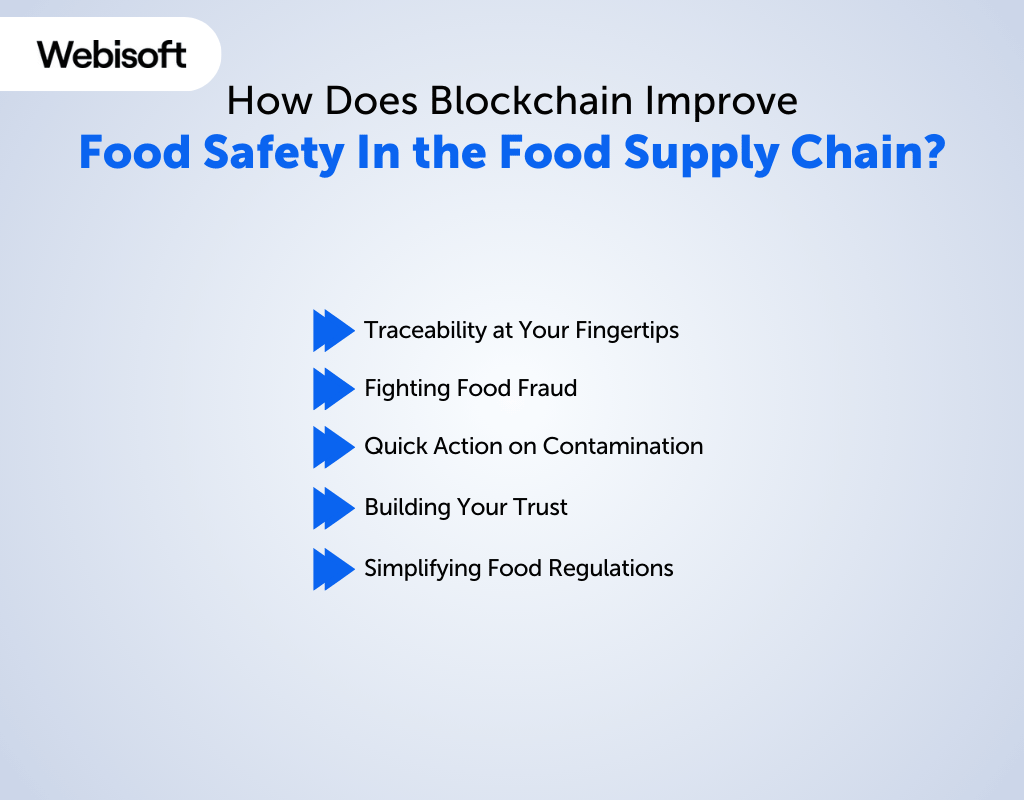
Now let’s talk about how the blockchain solution is making our food safer. It might sound technical, but it’s pretty straightforward. Here’s how it works in the food supply chain:
Traceability at Your Fingertips
Blockchain keeps a record of each step from where your food is grown to how it gets to your plate. It is great for tracking down any issues. If your food has a problem, you’ll know exactly where it came from.
Fighting Food Fraud
Are you ever worried about the authenticity of your food? Blockchain helps with that. It makes it tough for anyone to sell you something that isn’t what it claims to be. You get exactly what you’re told you’re getting, which is reassuring.
Quick Action on Contamination
Blockchain technology keeps our food safe by quickly finding any problems in the supply chain. This way, if something goes wrong, we can fix it fast. This speed is crucial for stopping the spread of contaminated food. Quick action means fewer health risks for everyone.
Building Your Trust
Knowing more about your food builds trust. With blockchain, every detail about your food’s journey is open for you to see. This transparency means you can be confident about your food safety and quality.
Simplifying Food Regulations
The food industry has lots of rules to keep food safe. Blockchain helps keep track of these rules quickly. It records everything, making it simpler to show that food meets safety standards.
Benefits of Blockchain in Food Supply Chain
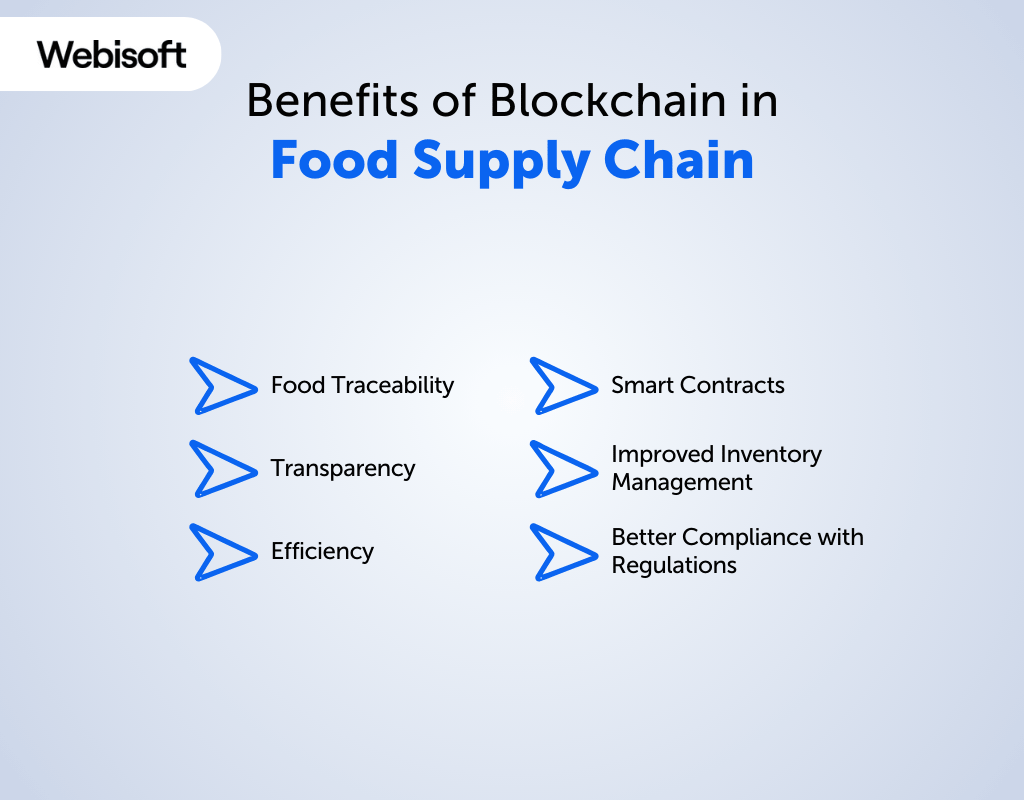
This section will explore the benefits of blockchain food supply chain. So, keep reading!
Food Traceability
With blockchain, tracking your food’s journey is easier. This tech records every step from the farm to your plate. So you can know where your food was grown and how it got to you. This makes your food safer and less likely to be something it’s not.
Transparency
Everything about your food is out in the open with blockchain. Everyone is involved, and even you can see all the details about your food.
Thus, you’ll know what you’re eating, where it’s from, and how it was handled. It’s all about building trust with what’s on your plate. Moreover, it makes supply chain management with blockchain easier and more transparent.
Efficiency
Blockchain makes the food supply chain run smoother and faster. It cuts down on paperwork and mistakes, so your food gets to you fresher and quicker. Less waste and speedy solutions are great for everyone, especially for you as a shopper.
Smart Contracts
Smart contracts are like automatic agreements that make things happen quicker. Payments and quality checks happen by themselves when certain conditions are met. For you, it leads to better quality food and more reliable shopping experiences.
Improved Inventory Management
This is about keeping track of food stocks better. Blockchain updates what’s in stock and how long it’s been there. Stores can manage their food better, meaning less waste and fresher options for you.
Better Compliance with Regulations
Sticking to food safety rules is super important. Blockchain makes it easier to follow these rules by keeping clear records. You get to eat food that’s handled safely and meets all the health standards. Healthier, safer food is always a win for you.
Application of Blockchain in the Food Industry
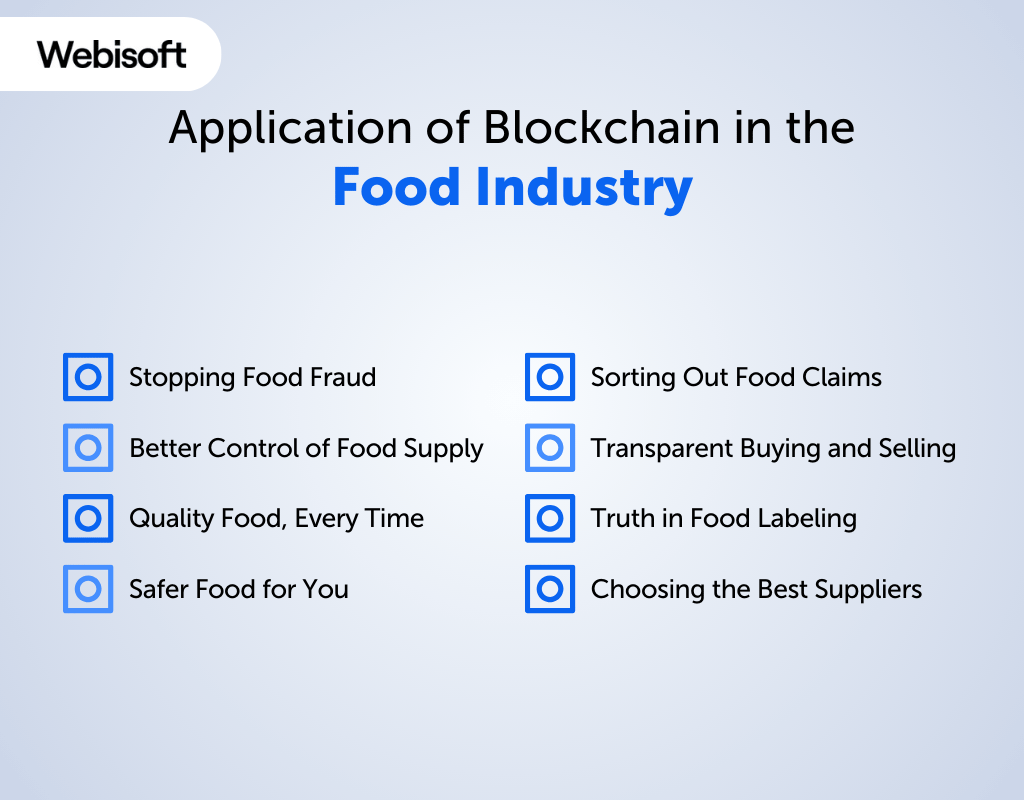
Blockchain is really shaking things up in the food world. Let’s break down how it’s making your food safer and more reliable.
Stopping Food Fraud
Worried about fake or mislabeled food? Blockchain cuts down on that. It tracks food from the farm to your table, so you know what you’re really getting.
Better Control of Food Supply
With blockchain, keeping an eye on the whole food journey is easier. It checks that your food is fresh and has come the right way. You end up with better food in your kitchen.
Quality Food, Every Time
Quality matters when it comes to what you eat. Blockchain watches over each step of the food-making process. Thus, the food you buy isn’t just safe. It’s super quality.
Safer Food for You
Food safety is a big deal. Blockchain keeps a close watch on how food is handled. If something goes wrong, it’s quick to spot and fix. So, the food on your plate is safer than ever.
Sorting Out Food Claims
Got a problem with a food product? Blockchain makes it easier to sort out. It keeps clear records, so any disputes can be resolved quickly and fairly.
Transparent Buying and Selling
When you buy or sell food, blockchain keeps things clear. It logs every transaction, making sure everyone plays fair.
Truth in Food Labeling
What’s on a food label should be true. Blockchain helps with that, making sure label info is accurate. This helps you make smart choices about what you buy.
Choosing the Best Suppliers
Picking the right food supplier gets easier with blockchain. It tracks suppliers’ records to make sure they’re up to scratch. You benefit from knowing your food is from a trustworthy source.
Different Food Sectors Utilizing Blockchain in Food Supply Chain
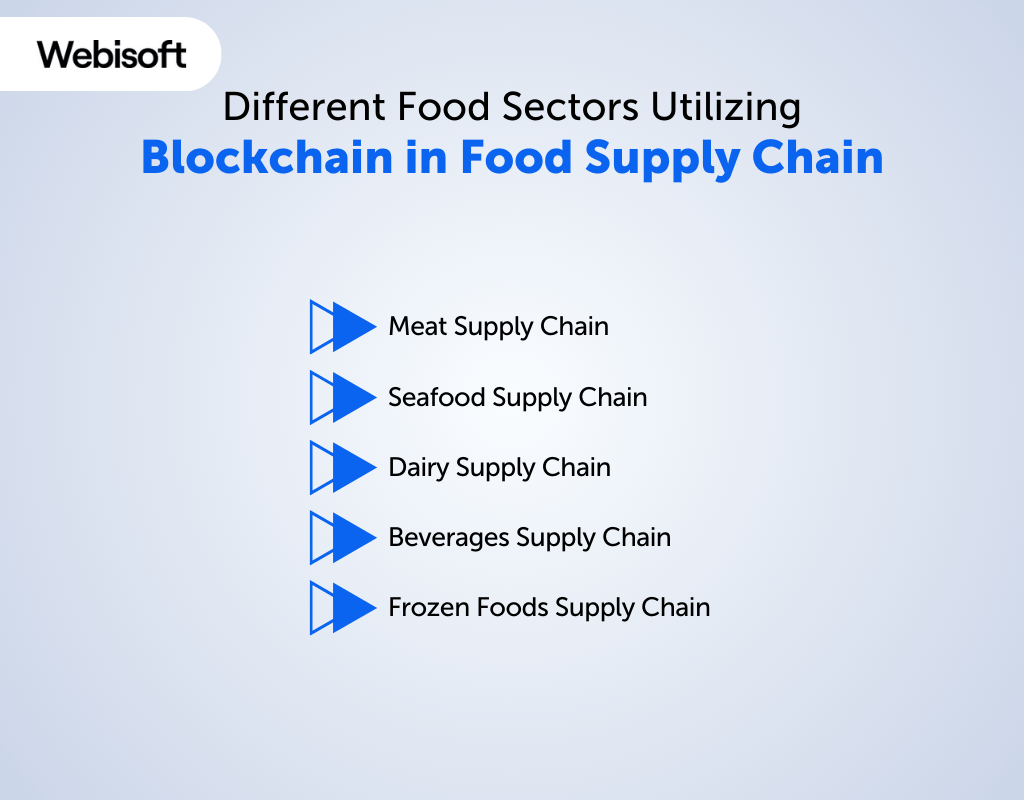
Let’s explore blockchain for food supply chains in different sectors:
Meat Supply Chain
For meat, blockchain lets you track where it comes from. Everyone involved, from farmers to stores, shares info on the blockchain. This way, you know the meat is good and safe. It also stops dishonest practices, like wrong labels. So, you can be sure about the meat you’re buying.
Seafood Supply Chain
In the seafood world, blockchain fights against illegal fishing and wrong labels. It tracks fish from the sea to your plate, ensuring it’s legally caught and fresh. This is great for restaurants and you. It means the seafood you eat is fresh and got to your plate the right way.
Dairy Supply Chain
Dairy products need special care, like keeping the right temperature. Blockchain helps with that. It keeps an eye on milk and other dairy items to make sure they’re safe and fresh. This cuts down waste by finding problems fast.
Beverages Supply Chain
Blockchain tracks what goes into your drinks, from coffee to tea. It checks where ingredients come from and that they’re real and good quality. This is important for things like organic or fair trade labels. So, when you drink your morning coffee, you know it’s the real deal.
Frozen Foods Supply Chain
In frozen foods, blockchain is a big help. It tracks how these foods are kept cold and handled. This ensures your frozen meals are fresh and safe when buying them. Less food gets wasted, and you get better, safer frozen food.
What are the Challenges of Implementing Blockchain in the Food Supply Chain?
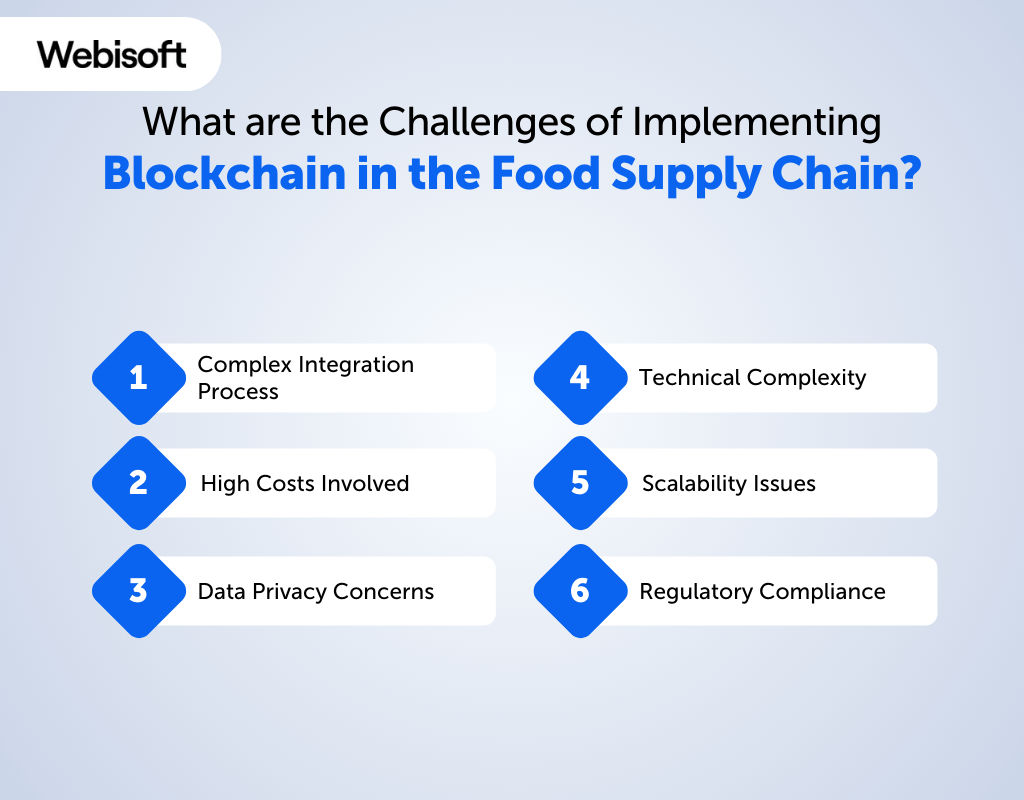
Blockchain is an important factor in the food supply chain, but it’s not without its challenges. The challenges include integration headaches, high costs, privacy worries, technical issues, scalability issues, and legal rules.
Let’s break these down:
Complex Integration Process
First off, fitting blockchain into the current food supply chain is tough. The systems we have now aren’t ready for it. Think about changing a lot of equipment and software, plus training people to use it. It’s a big task, but it’s necessary to make things work.
High Costs Involved
Setting up blockchain costs a lot. You’ve got the tech setup, training costs, and updating old systems. This might be too much for smaller businesses. But remember, this is an investment; the payoff comes with a better, more transparent food supply chain.
Data Privacy Concerns
With blockchain, everyone’s worried about keeping private info safe while sharing enough data to be useful. It’s a tricky balance to find. Keeping customer trust means being transparent but also protecting sensitive info.
Technical Complexity
If tech isn’t your thing, blockchain might seem overwhelming. But don’t worry; it’s all about having the right people to manage and fix things when needed.
Scalability Issues
Making blockchain work for a big, worldwide supply chain is a challenge. It needs to handle loads of data and stay efficient even as it grows. Starting with a system that can grow with your needs is key here.
Regulatory Compliance
The rules around using food supply chain blockchain are complex and constantly changing. So, you must keep up with these rules to avoid legal troubles and keep things running smoothly.
How Does Webisoft Help You to Implement Blockchain in the Food Supply Chain?
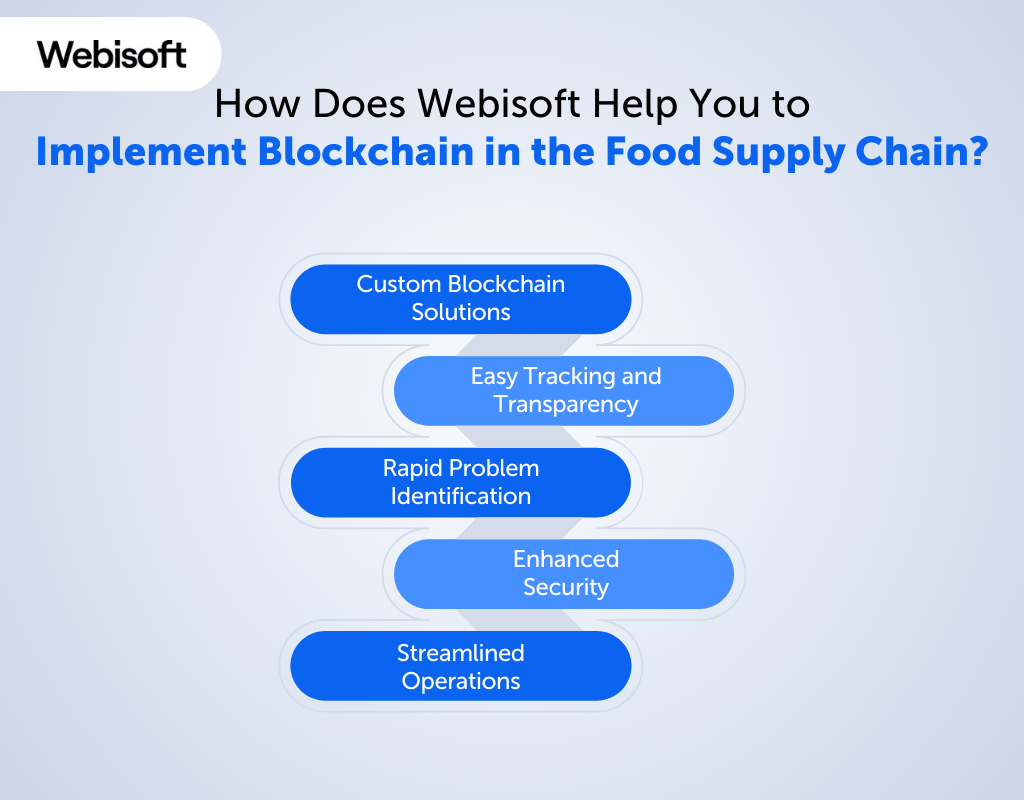
Webisoft makes adding blockchain to your food supply chain simple and effective. However, Webisoft helps you to implement blockchain in the food supply chain in the following ways:
Custom Blockchain Solutions
Webisoft builds blockchain setups just for you. They listen to what you need and create a system that fits your business. Thus, you get a blockchain that works exactly how you want it to, helping your supply chain run smoother.
Easy Tracking and Transparency
Tracking your food from the farm to the customer gets easier with Webisoft. Every step is recorded on the blockchain, so you can see the whole journey of your food. This makes your customers trust you more because they know where their food comes from.
Rapid Problem Identification
If something goes wrong, finding out where the problem started is fast. Webisfot’s blockchain helps you trace issues quickly, so you can fix them before they affect your customers. This keeps your food safe and reduces the chance of problems.
Enhanced Security
Blockchain is secure, and Webisoft uses this to keep your data safe. Every piece of information is encrypted and stored securely. Thus, your supply chain information is protected against hacking and tampering.
Streamlined Operations
Webisfot also makes your supply chain more efficient. By automating tasks with blockchain, you save time and reduce mistakes. This not only makes your job easier but also cuts down on costs.
However, ready to take your food supply chain to the next level with blockchain? Contact Webisoft today and start making your supply chain safer, more transparent, and efficient.
Final Note
To wrap it up, blockchain is really changing the way we track our food. Blockchain food supply chain is about making everything safer and more transparent. Of course, getting it set up has some bumps along the way.
However, if you’re in the food business and thinking about blockchain, Webisoft can help. We’re pros at using this tech to make food supply chains better. So, contact us today for any help!
Frequently Asked Questions
Can blockchain reduce food fraud?
Yes, blockchain can significantly reduce food fraud. It creates a tamper-proof record of the food’s origin, processing, and distribution, making it harder for fraudulent activities to occur unnoticed.
Is blockchain in the food supply chain environmentally friendly?
Blockchain itself is a digital technology and doesn’t directly impact the environment. However, it promotes sustainability by enabling more efficient supply chain management, reducing waste, and ensuring responsible sourcing.
How does blockchain technology provide transparency in the food supply chain?
Blockchain technology ensures transparency by allowing supply chain’s all parties to access and verify each transaction. Thus, the journey of food products can be tracked and authenticated at every stage.
Will blockchain make food more expensive?
Initially, implementing blockchain may increase costs due to the investment in technology. However, it can lead to cost savings in the long run by improving efficiency and reducing losses due to fraud and food safety incidents.
